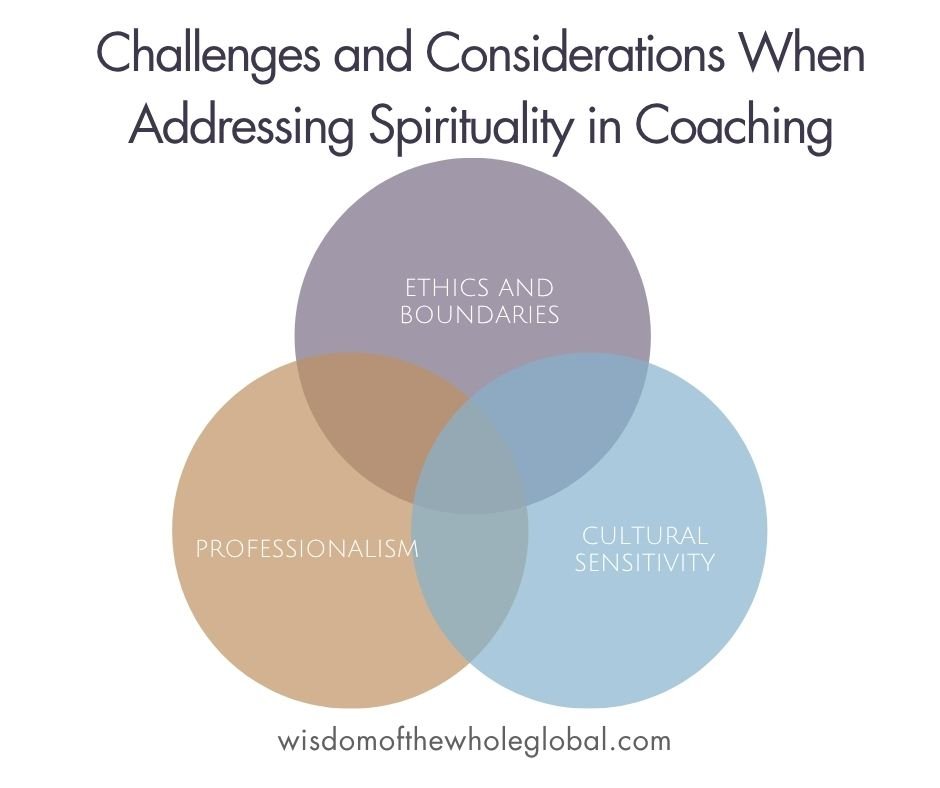The Role of Spiritual Intelligence in Coaching
Table of Contents
Introduction
What is Spirituality in the Context of Coaching?
Why Spirituality Matters in Holistic Coaching
Practical Ways to Integrate Spirituality into Coaching
The Wisdom of the Whole Approach: A Model for Spiritual Integration
Challenges and Considerations When Addressing Spirituality in Coaching
Conclusion: Embracing the Sacred in Coaching
The Role of Spiritual Intelligence in Coaching: Guiding the Whole Person Toward Transformation
I. Introduction
Coaching at Wisdom of the Whole is a holistic and transformational practice. Today’s clients are not just seeking career advancement or productivity gains — they are yearning for deeper authenticity, greater fulfillment, meaning, and purpose in their lives. As a result, coaches are increasingly being called to address not just the mind and behavior patterns, but the call of the heart and soul as well.
In this new landscape, spirituality is emerging as a powerful and necessary dimension of the coaching conversation. This may or may not involve religion in the traditional sense — it is entirely led by the client’s beliefs, and coaches approach spirituality in the context of something universal: a sense of purpose, values, connection, inner wisdom, and alignment with something greater than ourselves.
In this blog post, we’ll further explore what spirituality means in the context of coaching, why it matters, how to integrate it effectively, and how spiritual intelligence (SQ) complements other forms of intelligence in supporting deep, sustainable growth. We’ll also look at the Wisdom of the Whole model as a living example of spiritual integration in action.
II. What Is Spirituality in the Context of Coaching?
In coaching, spirituality refers to the human drive to find meaning, connection, and alignment with something beyond the self. This might be a higher purpose, a set of deeply held values, a sense of interconnectedness, or inner guidance. Importantly, spirituality in coaching is inclusive— it honors all belief systems and is tailored to the client’s unique worldview.
A client might identify as religious, spiritual-but-not-religious, agnostic, or something else entirely, and still bring a rich spiritual dimension to the coaching process. It’s the coach’s role to create space for that exploration without imposing any framework or belief.
So, what does spirituality look like in a coaching session?
It might surface when a client asks, “What am I here for?” or wonders whether they’re living in alignment with their core values. It might appear in moments of stillness, when the client touches a deep inner knowing, or when they speak of awe, gratitude, or connection to nature. A coach who is attuned to the spiritual dimension can recognize these openings and hold them with presence and reverence.
Spirituality also shows up in the exploration of inner knowing, legacy, service, love, and authenticity. These themes may not always be named explicitly as “spiritual,” but they are expressions of the client’s inner compass, guiding them toward a life that feels whole and meaningful.
III. Why Spirituality Matters in Holistic Coaching
Holistic coaching recognizes that people are multidimensional beings: mental, emotional, physical, and spiritual. Ignoring any of these facets limits the client’s potential for transformation. When spirituality is welcomed into coaching, it often unlocks deeper insights, resilience, and alignment that can’t be accessed through logic alone.
Spirituality matters because it connects clients to what truly motivates them beyond ego or external validation. When clients align with their values and sense of purpose, their goals become more meaningful and their actions more sustainable. They tap into a source of inspiration that fuels lasting change.
There is also growing recognition of spiritual intelligence (SQ) as a distinct and essential capacity on par with emotional intelligence (EQ) and cognitive intelligence (IQ). SQ is the ability to act with wisdom and compassion while maintaining inner and outer peace, regardless of the situation. It includes qualities like empathy, integrity, humility, and the ability to hold paradox.
Research in the field of transpersonal psychology and spiritual leadership has linked SQ with increased well-being, resilience, ethical behavior, and enhanced decision-making. In coaching, cultivating Spiritual Intelligence allows both client and coach to operate from a deeper, more grounded space — one that honors complexity, mystery, and the human spirit.
When coaches are equipped to explore this territory skillfully, they support not just change, but transformation — a shift in being that radiates outward into all areas of life.
IV. Practical Ways to Integrate Spirituality into Coaching
Bringing spirituality into coaching doesn't require special rituals or complex methodologies. What it does require is presence, openness, and respect for the sacred space in coaching sessions.
Here are some practical ways to invite the spiritual dimension into your sessions:
1. Ask Powerful Questions
Spiritual exploration often begins with a simple, profound question:
What gives your life purpose or meaning?
What do you feel called to do?
What inner wisdom is trying to speak to you right now?
Such questions open the door to purpose, values, and identity. They allow clients to tap into their deeper knowing.
2. Create Sacred Space
Treat the coaching session as a sanctuary free from judgment and filled with presence. Begin with a centering breath or moment of silence. Allow space between questions. This signals to the client that what they bring is held with reverence.
3. Integrate Mindfulness and Reflection
Practices like mindful breathing, visualization, body scans, and gratitude journaling can help clients connect with their inner world. Encourage clients to pause, notice, and reflect.
4. Use Ethical Awareness
Always follow the client’s lead. If spiritual topics emerge, welcome them; if not, don’t push. Be sensitive to cultural, religious, and personal boundaries. A simple check-in like, “Would you like to explore this from a spiritual perspective?” can ensure alignment and respect.
V. The Wisdom of the Whole Approach: A Model for Spiritual Integration
The Wisdom of the Whole Coaching Academy is a Holistic and Integral model that offers a unique approach for integrating spirituality into coaching. Its core belief is that coaching is not just about doing, but about being, and that true transformation arises from engaging the whole person.
Our model has at its core, Jean Gebser's 5 Structures of Consciousness that can help you authentically and more profoundly support your clients. It helps clients move through their coaching journey more quickly and easily, with greater confidence and authenticity. The integral and holistic coaching approach eliminates false starts and saves clients’ and coaches’ time and energy.
This model blends intuition and spiritual awareness with easy, practical evidence-based coaching skills and techniques. Students are trained to listen deeply, use presence as a coaching tool, and embrace the client’s spiritual expressions without labeling or judgment. The model also encourages coaches to cultivate their own spiritual intelligence, recognizing that who the coach is impacts how the coaching unfolds.
In practice, Wisdom of the Whole coaches might integrate guided imagery, reflective silence, or intuitive inquiry into sessions. They learn to hold both the seen and unseen elements of the coaching conversation, trusting that transformation is often catalyzed in the subtle spaces.
VI. Challenges and Considerations When Addressing Spirituality in Coaching
As with any powerful tool, spirituality in coaching must be handled with care. Here are a few key considerations:
1. Ethics and Boundaries
Coaches must refrain from imposing their beliefs or directing clients toward any spiritual path. The focus should always be on the client’s truth, not the coach’s.
2. Cultural Sensitivity
Spiritual expressions vary widely across cultures. What feels sacred in one tradition may not resonate in another. Coaches must practice humility and seek understanding, not assumptions.
3. Professionalism
Bringing in spirituality does not mean abandoning coaching core competencies, goal setting or action steps. It means integrating inner wisdom with outer action. Coaches should continue to uphold credentialing standards such as those outlined by the International Coaching Federation (ICF), the National Board for Health and Wellness Coaching (NBHWC), or the American Holistic Nurses Credentialing Corporation (AHNCC). This includes standards such as confidentiality, competence, and ethical conduct to name a few.
When done respectfully, exploring spirituality can enhance the professionalism of coaching.
VII. Conclusion: Embracing the Sacred in Coaching
As coaching continues to evolve, spirituality is truly not a fringe element — it’s an essential thread in the fabric of human transformation. Addressing the spiritual dimension invites depth, presence, and meaning into the coaching relationship, supporting the client’s wholeness and authentic growth.
When coaches cultivate spirituality and create space for the sacred, they empower clients to lead lives of deeper purpose and alignment.
If you’re a coach or aspiring coach, consider exploring your own spiritual lens and how it shows up in your work. Be curious. Be open. And trust that even in silence, something sacred is unfolding.
Ready to Transform Your Coaching Practice?
Discover the profound impact of integrating spirituality into your coaching with the Wisdom of the Whole model. Embrace a holistic approach that nurtures the mind, body, and spirit, and empowers your clients to achieve their fullest potential.
Join us today and become a certified life coach! To learn more visit: https://www.wisdomofthewholeglobal.com/become-a-certified-life-coach








